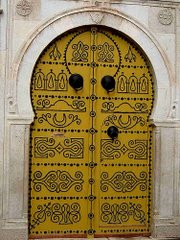Sunday, November 26, 2006
Palestine, peace not APARTHEID.
The best offer to the Palestinians [at Camp David in December 2000]--by Clinton, not Barak--had been to withdraw 20 percent of the settlers, leaving more than 180,000 in 209 settlements, covering about 10 percent of the occupied land, including land to be "leased" and portions of the Jordan River valley and East Jerusalem.
The percentage figure is misleading, since it usually includes only the actual footprints of the settlements. There is a zone with a radius of about four hundred meters around each settlement within which Palestinians cannot enter. In addition, there are other large areas that would have been taken or earmarked to be used exclusively by Israel, roadways that connect the settlements to one another and to Jerusalem, and "life arteries" that provide the settlers with water, sewage, electricity, and communications. These range in width from five hundred to four thousand meters, and Palestinians cannot use or cross many of these connecting links. This honeycomb of settlements and their interconnecting conduits effectively divide the West Bank into at least two noncontiguous areas and multiple fragments, often uninhabitable or even unreachable, and control of the Jordan Valley denies Palestinians any direct access eastward into Jordan. About one hundred military checkpoints completely surround Palestinians and block routes going into or between Palestinian communities, combined with an unaccountable number of other roads that are permanently closed with large concrete cubes or mounds of earth and rocks.
There was no possibility that any Palestinian leader could accept such terms and survive, but official statements from Washington and Jerusalem were successful in placing the entire onus for the failure on Yasir Arafat[....]
In April 2003 a "Roadmap" for resolving the Israeli-Palestinian conflict was announced by U.N. Secretary-General Kofi Annan on behalf of the United States, the United Nations, Russia, and the European Union (known as the Quartet).The Palestinians accepted the road map in its entirety but the Israeli government announced fourteen caveats and prerequisites, some of which would preclude any final peace talks[....]
International human rights organizations estimate that since 1967 more than 630,000 Palestinians (about 20 percent of the total population) in the occupied territories have been detained at some time by the Israelis, arousing deep resentment among the families involved. Although the vast majority of prisoners are men, there are a large number of women and children being held. Between the ages of twelve and fourteen, children can be sentenced for a period of up to six months, and after the age of fourteen Palestinian children are tried as adults, a violation of international law[...]
The United States has used its U.N. Security Council veto more than forty times to block resolutions critical of Israel. Some of these vetoes have brought international discredit on the United States, and there is little doubt that the lack of a persistent effort to resolve the Palestinian issue is a major source of anti-American sentiment and terrorist activity throughout the Middle East and the Islamic world[...]
The bottom line is this: Peace will come to Israel and the Middle East only when the Israeli government is willing to comply with international law, with the Roadmap for Peace, with official American policy, with the wishes of a majority of its own citizens--and honors its own previous commitments--by accepting its legal borders. All Arab neighbors must pledge to honor Israel's right to live in peace under these conditions. The United States is squandering international prestige and goodwill and intensifying global anti-American terrorism by unofficially condoning or abetting the Israeli confiscation and colonization of Palestinian territories.
Excerpts from the book from various web sites.
Q: In your book, you argue that ‘because of powerful political, economic, and religious forces in the United States, Israeli government decisions are rarely questioned or condemned.’ Can you explain that more fully?
A: I’ve been all over the Holy Land, I’ll call it, just for a kind of a shorthand description, since the 1970s — the last 30 or 40 years — from Lebanon down to the Sinai. And I’ve been up into the Golan Heights three times, and I’ve conducted three elections there — and I’ve seen the coverage given to Israel’s activities in Europe and in Israel itself — a highly contentious debate over [Israel]. There is no such debate in the United States. There’s not any debate in the Congress. There’s not any debate in the White House, at least since George Bush Sr. and I were there, and in the news media of the United States there is very rarely any editorial comment that would criticize some of the practices of Israel which I consider to be deplorable — and that is the persecution of the Palestinians, and the occupation and confiscation and the colonization of Palestinian land. So there’s no open debate in this country if it involves any criticism of the policies of the Israeli government, even though many people in Israel debate and condemn some of the policies of the right-wing governments under Sharon and Netanyahu and others.
Q: Lately there has been a lot of discussion about the role of the ‘Israel lobby.’ Can you say a little bit about how that impacted you as president? Has it changed over time?
A: Well, I think the Israel Lobby — so-called to use your phrase, that’s not my phrase — is much stronger now and much more effective now than it was when I was in office. I felt, for instance, that we should sell F-16 airplanes to Saudi Arabia so Saudis could defend themselves against threats from Iran, and Aipac and others were adamantly against it, but we finally prevailed. And I called within three months of when I went into office for a Palestinian homeland. And I worked for the Camp David accords, which called for Israel’s political and military withdrawal from the occupied territories, and so forth, and I think that that kind of independence was also exhibited by George Bush Sr., who condemned Israeli settlements in the West Bank and even withheld funds from Israel, which I never did, by the way.… That’s almost an impossibility now in the present political environment of America.
Carter discussing his book on forward.com
Subscribe to:
Post Comments (Atom)





3 comments:
Looks like it's worth buying and reading! I'll get it inchallah!
thanks for the link man
J'apprécie de plus en plus Jimmy Carter.
Je pense qu'il aurait fait un excellent président post-guerre froide même si je ne me fais pas d'illusions sur la fait qu'il aurait suivi les grandes lignes de la politique internationales des Etats-Unis.
Pour ce qui est du terme Apartheid, je suis tout à fait d'accord. Je dirais même que c'est une forme plus subtile, plus perverse et finalement plus efficace que celui qui prévalait en Afrique du Sud.
A l'intérieur même du territoire Israélien c'est assez subtil: il n'y a pas de discrimination directe vis à vis des arabes palestiniens mais il faut savoir que si on passe pas le service militaire on n'est qu'un citoyen de seconde zone (pas d'accès à certains emplois, services sociaux...). Et les palestiniens ne le passe évidemment pas...
Pour ce qui est des territoires de 67, on se trouve avec deux cas de figures:
- une prison à ciel ouvert: gaza
- un ensemble de bathoustans à la sauce moyen orientale: cisjordanie.
Enfin, si le soutient à Israël avait une quelconque valeur pour les Etats-Unis, celà est de moins en moins le cas.
Israël est de plus en plus "un poids stratégique" (au sens négatif) pour eux qu'un atout.
Je suis d'accord sur le fait que le soutien des US perd de sa valeur. Beaucoup d'americains le percoivent comme la raison principale du terrorisme contre les USA.
Beaucoup de juifs-amaricains sont entain de se poser la question sur la politique d'Israel (88% des juifs americains votent democrate).
Pour Israel, je crois qu'il n'y a que les israeliens qui peuvent changer le comportement de leur gouvernement, pas les US ou UN
Post a Comment